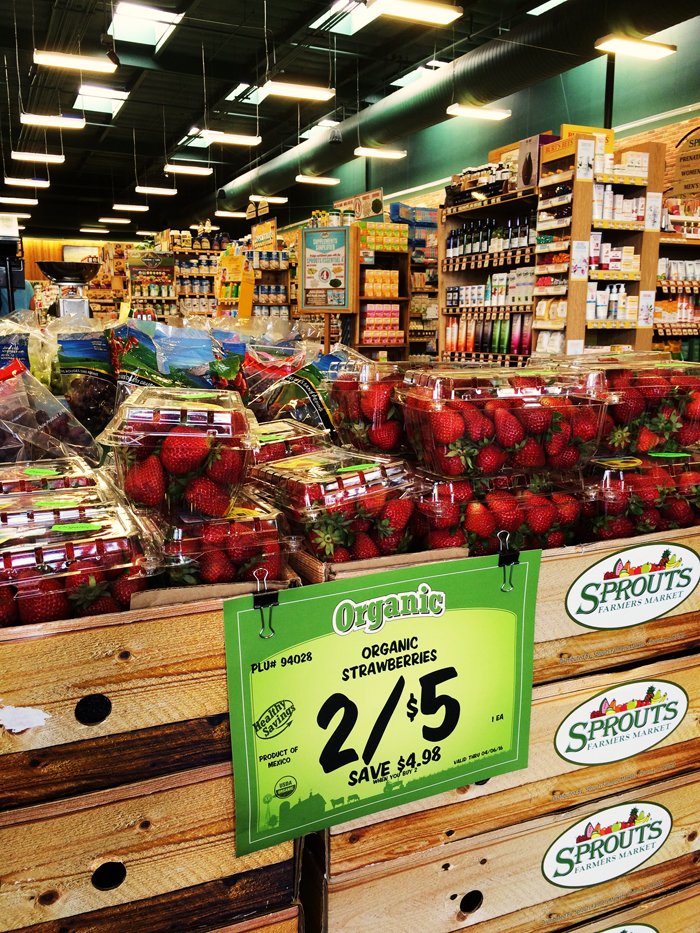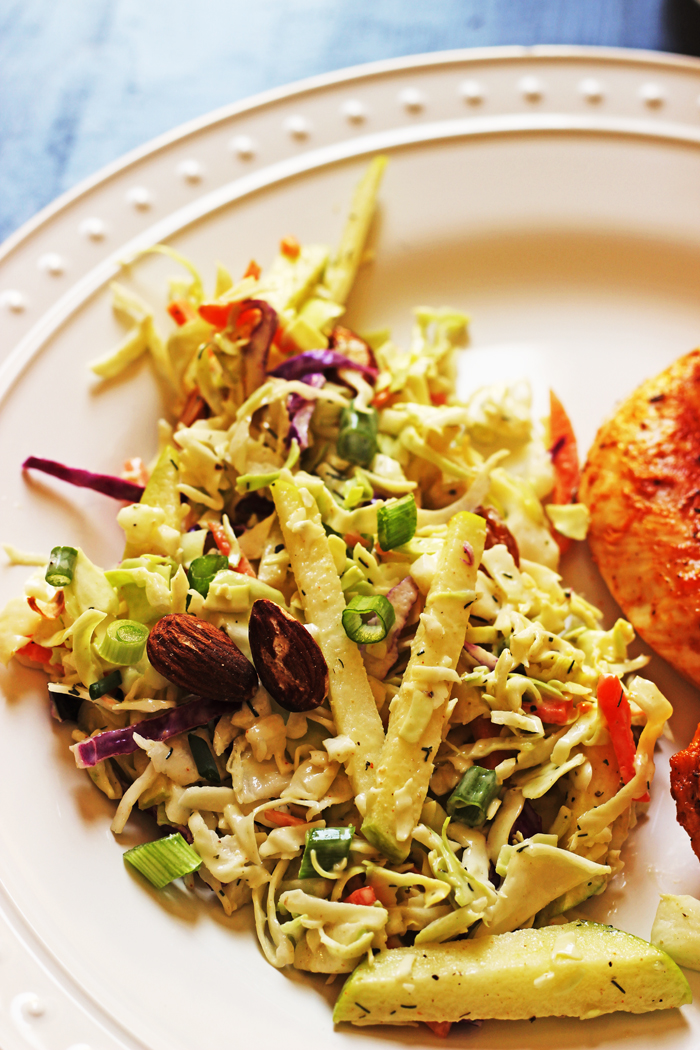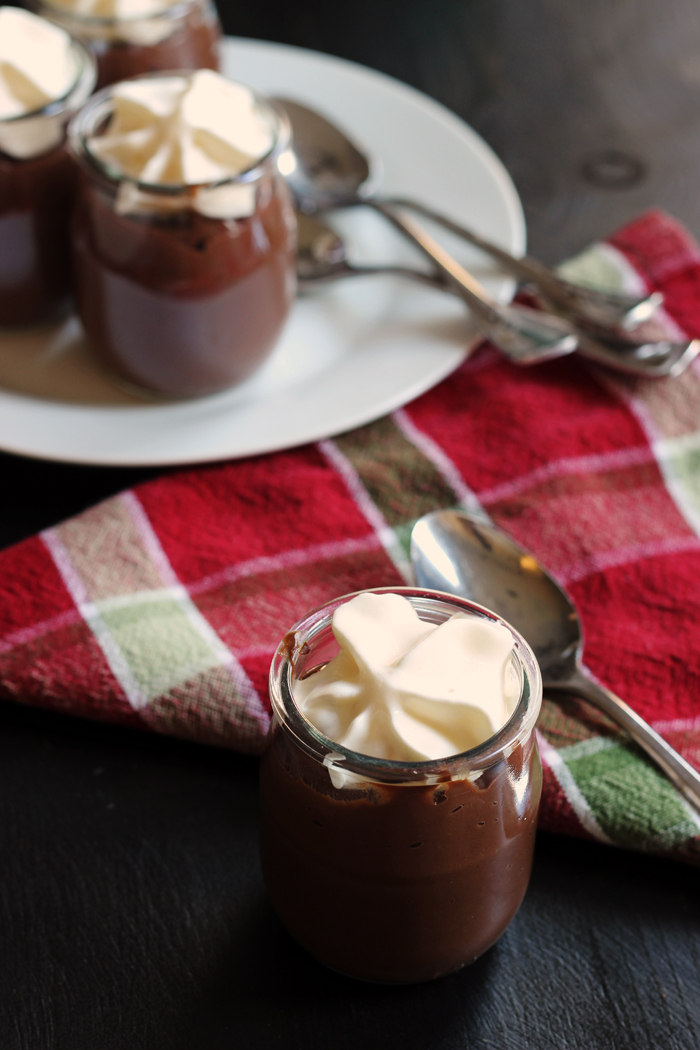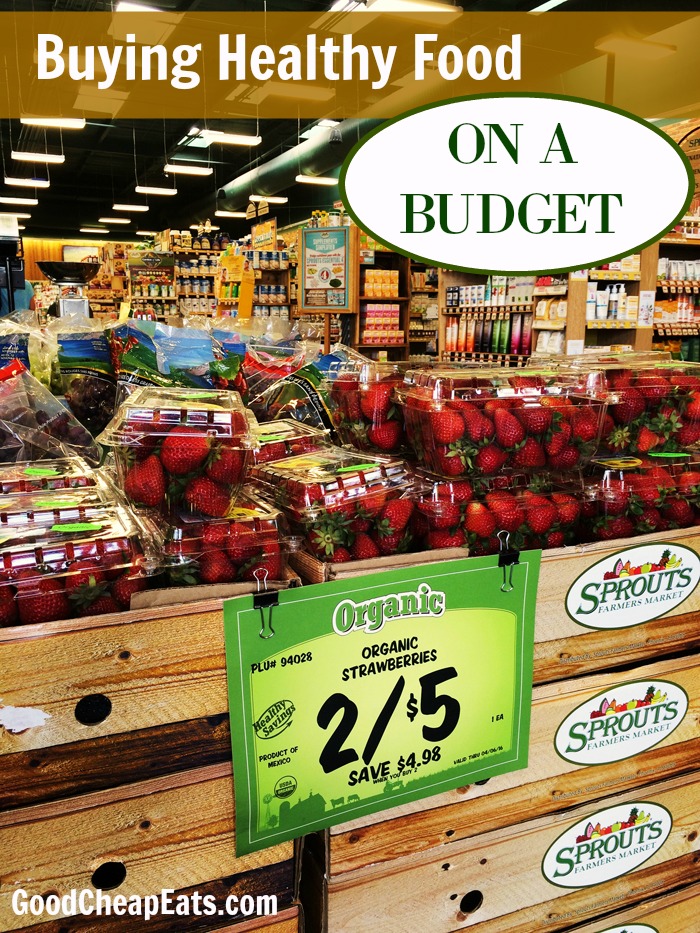Buying healthy food on a budget is possible! You don’t have to relegate yourself to cheap, processed items. You do need to shop wisely. Here’s how.
Want to save this post?
Enter your email below and get it sent straight to your inbox. Plus, I'll send you budget recipes and money-saving tips every week!
Eating healthy on a budget can be tricky because healthy food tends to be more expensive than bad-for-you food. A quick glance at the grocery store ads shows how easy it is to find sodas, highly processed meals, and “snack foods” for cheap. Sometimes the convenience or the “fun food” can be too tempting!
And nutritionally bankrupt.
Once upon a time, I leveraged sales and coupons to stock my cupboards with junk food items. At one time we had 44 boxes of sugar cereal on hand! What can I say but that it was free?!
However, I knew we weren’t eating healthfully. I knew we needed to change. Once we were out of debt, I let myself finally read the books that changed my thoughts on food.
Since then I’ve done a massive overhaul on our family’s diet. We eat mostly homemade and have introduced lots of fresh fruits and veggies. Some of us in the family still crave junk food, but most of us don’t like how it makes us feel.
And I’m pretty certain I can say that no one truly wants a steady diet of the stuff. Not if they’re honest, anyway.
Buying Healthy Food on a Budget
Despite the fact that I’ve got most of the family on board the healthy food train, I have to make careful purchases as buying whatever is labeled “organic” or “all-natural” could easily get us over budget.
Here are some of my strategies for buying healthy food on a budget:
Stock up on in-season, on-sale, fresh fruit and veggies.
It’s not my habit to buy whatever fruits and vegetables we want on a given day, despite how good they are for us. Instead, I buy what’s on sale, and that’s what we enjoy. Typically this means we eat most fruits and vegetables in season or when the grocery store thinks the rest of the world wants them.
This sometimes means that if there is a fall when there is no good price on apples, we go without.
I have target prices for produce, not spending more than $1/pound on most items, though I will go over for items in the dirty dozen list, like strawberries or apples.
Want more tips to make meals good and cheap? Get the newsletter!
Sign up for the Good Cheap Eats newsletter so you can get all the dish on how to eat well, act your wage, and enjoy your life!
Cabbage Slaw with Apples and Almonds
Stretch proteins and carbs with vegetables whenever possible.
There are fad diets all over the place that preach a certain amount of proteins and carbs. I’m not knocking it; I’m currently doing a Whole 30 myself. But I’m well aware that science and popular convention change with the wind when it comes to diet and nutrition. Tomorrow it will be something different.
However, one constant, one thing they all seem to agree on is that you should eat lots of vegetables.
And guess what? Vegetables are cheap in comparison with the pricier proteins. I can offset our grocery bill by stocking up on in-season, on-sale vegetables. It’s better for us, and doesn’t have to put us in hock.
Shop the sales and stock up on great priced items.
One of my biggest lessons in grocery shopping was to shop the sales instead of buying whatever it was that I wanted. It took some getting used to, but over time, I’ve learned how to build up our pantry with sale purchases so that we can stretch our dollar farther.
I regularly scan the sales as well as the clearance racks for healthier items and am usually very pleasantly surprised to find better quality and organic items at very low prices. I just have to keep my eyes open!
Avoid the junk.
Just say NO. Even when the junk food is free or really, really cheap, I have to tell myself NO. It’s hard to resist, but it’s not a deal if it contributes to my waistline or undermines my family’s health. Make every bite count, whether it’s money or calories!
Homemade Chocolate Pudding
Make my own treats.
Eat all the junk food you want as long as you make it yourself. I like that motto.
Instead of buying the cheap-cheap, processed treats, I can limit our junk food by making my own, better-tasting, better quality goodies. While they still might be considered “less healthy” than a bowl of green beans, homemade baked goods and treats are cheaper than their store bought counterparts — and since they take more effort to make than buying the box, I will indulge less frequently because I’m lazy. Ha!
Making my own healthy treats, like Mamabars is particularly helpful when the health food brands are priced so high. I can still enjoy goodies without paying the high price.
Splurge wisely.
My husband and I do enjoy good quality cheese, chocolate, and coffee. Buying quality tends to make a big difference in taste. We also splurge occasionally on heftier priced health items like supplements, nuts, and oils. These are things that we don’t usually devour in one sitting, so we can stretch our purchases and enjoy the good life without going broke.
Following these strategies helps me feed my family a better-than-average diet without spending more than we can reasonably afford. And we all feel better!
How do YOU buy healthy food on a budget?
I’d love to hear what YOUR tricks are for eating healthy foods while sticking to a budget.






Joleen
We live in a large farming community, where the kids learn a lot of life skills in 4H. Our family has a large garden and we have several neighbors/family members that do too. We have a bartering system for fruits and veggies to share amongst ourselves during the summer months when canning and freezing is in full swing. There’s also a little bit of wiggle to what we pay for the meat purchase if the kids use the animals for 4H. We purchase meat by the animal (lamb, pig, chickens, 1/2 a cow) this does mean we’ve had to get 2 deep freezers to keep all the meat and frozen veggies. Purchasing the meat this way from the farmer and then paying the processing at the butcher is quite a bit of money upfront but when you divide the amount by 8 months it levels out to be not so bad. All of this pays off in the harsh winters when we are unable to get to town, 15 mins away with good road conditions. I know the food preservation done in the past isn’t for everyone but in our part of the state it’s very popular when our options are more expensive produce and not necessarily organic from a small town grocery store, or travel 30 minutes to get to better prices at an Aldi, Cub Foods, or Walmart.
Jessica Fisher
What a great system you have, Joleen! Nicely done!
Maryalene
This may be a YMMV thing, but if you can swing the upfront cost of a CSA, I’ve found their produce overall costs less then what you’d pay in the stores.
Jessica Fisher
Yes, it can be a great money savings! We did a CSA-type thing for about three years, but with the drought and some customer service issues last spring I discontinued it, knowing that it wouldn’t pencil out until CA bounced back.
Great strategy depending on where you live!
June
I think you’re right about making your own junk food. Just read the labels on junk food you buy. I don’t put all those unpronouncable ingredients in mine?
Jessica Fisher
Exactly!
Mariah
Great info! I have the same thoughts of nutrition after implementing Nourishing Traditions, Trim Healthy Mama, Whole30 and several other ideals. Your thoughts on this post are my own. I’ve studied nutrition for many, many years! 🙂
Jessica Fisher
Great minds…. 🙂
Holly Williams Urbach
My hubby and I live on a very small income. Like you, we have developed the
habit of buying marked down items and clearance items, stocking up as funds permit.
We eat a lot of organic items and garden intensively. Our goal is to eventually grow all of the produce
we eat. We live in central Texas where we can garden 365 days a year. I make my menus after I buy my good deals instead of before shopping.
Jessica Fisher
What a great goal! I love it!
Tiffany R
I stock up on chicken when it goes on sale for $1.99/lb and freeze it in marinade. I bought 50# of chicken today and am working my way through it this afternoon. We do not eat organic yet because our budget can’t handle it but I try to buy the best we can afford. When strawberries and blueberries are cheap, I buy them in bulk and freeze them for later. My freezer is my friend. Thank you for all your help!
Jessica Fisher
These are great strategies for buying in bulk and making it work for you.
Kristie Speakman
Aldi has significantly increased their organic options in the last year. This has helped us begin switching to organic/non_gmo. Also the Horizon brand is mostly organic and offers really good coupons plus they are often on sale here in Ohio and Kroger almost always has organic yogurt clearance priced. But one of the most helpful habits is that we just stopped buying junk and didn’t try to replace it with a better option, example: fruit snacks, yes there are organic options available, or I could make my own but we just don’t eat them anymore.
Jessica Fisher
That’s a good method for cleaning up your diet, just avoid buying it.
Melissa
I’ve read your blog for a while now and practice all of your tips. I wish I could buy produce for $1/pound! I save our budget with a lot of frozen fruit and veggies. My local store had a sale on frozen veggies for .79 / bag when you buy 10 recently. I bought 20 bags! We are also aiming to grow a garden and freeze and can a lot this summer.
Jessica Fisher
I’m finding that I love having frozen veg from Trader Joe’s. The convenience when I’m tired is so helpful! It’s not 79 cents a bag, though. Hmph. 😉
KatieBee
We eat similarly; we couponed to get out of debt for a few years, but for the past 2-3 years ive stopped for the most part. Now we eat a lot more from the earth, so to speak. We have a huge farmers market down the street twice a week, so we can get in season, local and mostly organic produce that isn’t off the charts expensive. I spend about $30-40 a week on fresh produce there. I make most of the treats we consume and we don’t regularly consume, maybe once or twice in a week at most. We buy hormone free meat, chicken and wild caught salmon in bulk a couple times a year ($800-900 each time) which helps me keep my weekly total under $150. We eat few grains, but what we do is bought in bulk 2-3 times a year. We consume a good deal of eggs, nuts and nut butters for protein and I splurge on organic coffee beans, organic eggs, good oils and grass fed butter. Because I have autoimmune issues, we keep the processed stuff to a bare minimum in our house, but my kids are welcome to use their money to buy junk food otherwise. I also purchase organic frozen vegetables and fruits at Costco pretty regularly, which helps with our meal planning and to fill in when we have nothing but ginger root left in between farmers markets runs ?.
Jessica Fisher
Sounds like you’ve got some great strategies!
Alice E
Good Post! I agree with shopping the sales. We haven’t switched to organic milk and meat, yet, but we are an older couple. I think if I was still raising children instead of retired I might do differently.
Since produce can be high here, we do a lot of frozen. I have even bought vegetables cheap on sale and frozen them myself. Having a freezer and shopping sales saves us a lot of money. Also, I have been lucky to get free fruit ( apples and pears)some years, twice from my father-in-law and once from my sister and her son. Canning it up meant lots of fruit for very little cost. I do garden some years but not much, sometimes just herbs.
I do bake bread and treats a lot. We usually eat hot cereal and rarely buy the boxes of cold cereal. I do have a manual grain mill and flaker. I don’t try to grind flour as much, but we used the flaker quite a bit to flake various grains for hot cereal and really enjoyed that. But, I bought oatmeal at Costco and it is taking a long time to use that much oatmeal up, so I haven’t flaked any grain in quite awhile.
We do indulge in cashews from Costco, occasional chocolate, and I splurge on really good tea, usually when it is on sale, but neither of us are coffee drinkers so that isn’t an issue.
Jessica Fisher
Yes! Freezing or canning your own when you get great pricing is THE best way. Love that! I wish I had access to a good farmer. lol.
What is a flaker?
Alice Edwards
The flaker basically flattens grain to make flakes, When I bought my ‘Family’ brand manual grain mill it came with a separate base and the mill that fits on the base. The flaker is just another attachment that fits on the same base.
It works really well with whole oat groats and soft wheat. With hard wheat you get some shattering I think because what you get is much smaller and less of a distinct flake. But, it’s still edible, just different. I have also added barley, rye and rice to the mix of grain I am using to make a mixed grain cereal.
I generally cook them the same way I cook old fashioned oats. I use what I call the lazy method. I bring one and a half cups of water to a hard boil, then add one cup of oats, stir it for a couple seconds, put the lid on my one quart pot and turn off the burner. About ten minutes later it is ready to eat. The texture is different from regular oatmeal, but we like it better. I don’t know how it would work for a big batch, since for the two of us I’ve never tried it. Salt and or dried fruit are optional add-ins. This is a bit wordy, but I hope it answers your questions.
Jessica Fisher
Thanks for taking the time to answer. Sounds so interesting! I’ve never owned a mill, so it’s kinda all new to me.
Donna
Love this post. I too, would add that finding a good farmer’s market is key… go weekly and stock up on veg and fruit that is in season. I think it really helps to take your kids too…gives them a connection to their food and the farmers, if you don’t have a garden of your own. I too, lived on processed food to pay down debt….and when we made the switch, I knew it was more than just changing the food I was feeding my kids, it was changing their mindset about eating, cooking and where it came from. It is truly a lifestyle change. A GOOD lifestyle change! Our splurges are good coffee, good cheese and good chocolate too!
Janet
You are so right about giving our city children a connection to where food comes from. About 10 years ago I was at the Farmers Market. A mother was paying for some broccoli. Her son, I would guess he was about 4 years old, told her in a loud whisper “Mom don’t buy that. It has dirt on it” She had to reassure him that the food was fine. It was so cute, but I remembered that moment when I became a mother several years later.
Jessica Fisher
Sweet story, but yes, it’s good for kids to know where food comes from. lol.
Jessica Fisher
Now here’s a situation where “your mileage may vary”. The SD County Farmer’s Markets are not cheap — and they say so on their website. We’re not here to get you a deal, just provide farm to table produce. A bit annoying because I’ve lived other places where the farmers market was THE place to get good quality for great prices.
Michelle S.
Agreed! In San Luis Obispo County, the farmer’s markets are glorious, but very pricey. I am able to get local, seasonal, beautiful produce at a good price by subscribing to a local CSA program. Almost all of it is organic, and it is $26 a week! Such a deal. Yesterday we got 2.5 pounds of white peaches, 2.5 pounds of pluots, 2 jumbo avocados. 4 heirloom tomatoes, a huge head of romaine, a head of raddichio, 4 large sunburst squash, a bunch of green onions, a bunch of arugula, a giant bag of blue lake green beans, and 4 large red, sweet onions.
I see what we get in our box, then l plan our meals around that by first visiting our local Grocery Outlet Bargain Market, to check what they have. They usually has loads of organics and different items for great prices. You never know what they will have, though, so l check first, then shop at Von’s or Trader Joes to fill in for the week. It is how l am able to afford good quality food on a budget. We also eat a lot of meatless meals, or eat small portions of meat so we can buy organic or pastured meat. It is so expensive!
I, too, love good cheese, so l buy more strongly-flavored kinds, since a little goes a long way. I get a delicious French sheep’s-milk feta at Costco. It has so much more flavor than the regular grocery-store kind, and adds a lot of oomph to a meal with just a little cheese.
Jessica Fisher
Sounds like Templeton Farmer’s Market is no longer a bargain, eh? It used to be, back in the day. womp. womp.
THanks for sharing some great strategies.
Janet
I use coupons and shop the sales. If the taste and quality are good, I buy the store brand. We rarely buy organic produce. However, we do try to buy hormone free meat and dairy. Our splurges are diet Coke, Peet’s coffee and pistachios. I make many of our own bread products to save as well. We use beans and eggs a lot to stretch our protein dollars.
Jessica Fisher
I think splurges are a necessity!
Patsey Manning
I very much enjoy your tips on good and healthy shopping. I’m a senior single these days, my son is grown and on his own. So I’m buying for me and my adored kitty. I like to go to our local Farmer’s Market, it is terrific, is year round though of course the offerings differ seasonally. Also, I think frozen fruits and veggies are good, nutritious and budget wise purchases. I’m a couponner and sale shopper. I tend to buy store brand mostly, buy national brands only on a good sale or with good coupons. Thanks for such a good blog, keep informing us please.
Jessica Fisher
Thanks so much, Patsey!
karen b
I love this & agree w/ the most part of it. There is one area I don’t totally agree w/ though is only buying produce thats a $1 a pound or less…..I can tell you live in an area where produce is cheap 🙂 Here on the east coast not so much, its nothing to pay a $1.25 or more for a head of iceburg letttuce & the leafy lettuces mostly just forgetaboutit. Thankfully the last couple weeks they have only been a $1 a head even for the leafy ones. The oranges this winter only 1 week I seen them at a $1. The one lifesavor for me is we have a garden every year & I can& freeze lots of things so that helps so much 🙂 I enjoy your blogs so much & have got so of our goto recipes from you 🙂
Jessica Fisher
Ah, yes, living in CA we do have a generally lower price on produce. We pay for milk and meat, though, so we make up for it there. lol. But, yes, just adjust your target price for veggies and you’re good. 🙂
Awmeme
We moved from the Or/Id area to MN a little over a year ago. Even though there are Aldi’s and we belong to Costco I only go to them about every other month or less(rotating months) since I typically do it to stock up on stuff besides food. I have found that the gas station qwiktrip typically has good prices on bananas 0.29/lb, eggs $0.99/dz, milk $2.29/gal or cheaper. Most months they have some sort of meat (not organic but typically antibiotic free) on sale as well usually cheaper than the grocery store. Also instead of loose lettuce or whatever you want to call it you might try buying the packages of hearts of romaine. Most of the time they come in a 3-6 ct package most I’ve ever seen them run for is $5 usually less. I can usually make 4-5 meal size salads big enough to fill up an adult man from one heart of romaine. I find the ones I get from Costco $3.29/6 ct package will last in the fridge usually 4-6 wks or longer.